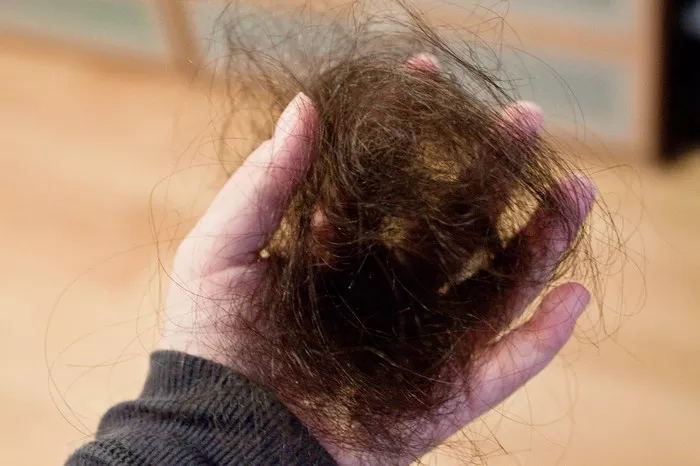Hair loss can be a distressing issue, and for individuals with Polycystic Ovary Syndrome (PCOS), it can be an even greater concern. PCOS-related hair loss, medically known as androgenic alopecia, occurs due to hormonal imbalances that trigger excessive production of androgens. If you’re grappling with hair loss as a result of PCOS, fear not. This article is here to provide you with valuable insights and actionable strategies to combat hair loss and regain your confidence.
Understanding the Link between PCOS and Hair Loss
Here’s the link between PCOS and hair loss:
1. Unpacking PCOS
Polycystic Ovary Syndrome (PCOS) is a hormonal disorder that affects individuals’ reproductive and endocrine systems. It leads to irregular periods, ovarian cysts, and hormonal imbalances, including an increase in androgens—the male hormones that can trigger hair loss in women.
2. Androgenic Alopecia: The Culprit
Androgenic alopecia, also known as female pattern baldness, is a type of hair loss that is often linked to hormonal factors. In individuals with PCOS, excessive androgens can shrink hair follicles and lead to thinner, shorter, and less pigmented hair strands.
See Also: Does Trauma Cause Hair Loss: Things You Need To Know
Building an Effective Hair Care Routine
The following are effective hair care routines:
1. Gentle Cleansing and Conditioning
Opt for sulfate-free, gentle shampoos that cleanse the scalp without causing further irritation. Follow up with a nourishing conditioner that adds moisture and strengthens your hair.
2. Avoid Heat and Chemicals
Limit the use of heat styling tools and harsh chemicals, as they can weaken the hair and exacerbate hair loss. Embrace natural hairstyles that put less strain on your hair follicles.
3. Scalp Massage and Care
Regular scalp massages can improve blood circulation to the hair follicles, promoting hair growth. Consider using essential oils like rosemary or lavender, known for their potential to support hair health.
Dietary Adjustments for Hair Health
Here’s what to eat for healthy hair:
1. Balanced Nutrition
Adopt a balanced diet rich in nutrients that support hair growth. Include lean proteins, whole grains, fruits, vegetables, and healthy fats. Omega-3 fatty acids found in fatty fish and flaxseeds can also aid in maintaining hair health.
2. Iron and Biotin-Rich Foods
Iron deficiency can contribute to hair loss. Incorporate iron-rich foods like spinach, lentils, and lean meats. Biotin, a B-vitamin, is known for promoting healthy hair and can be found in eggs, nuts, and seeds.
3. Curb Sugary and Processed Foods
High sugar intake and processed foods can lead to insulin resistance, a common issue in PCOS. By reducing your consumption of these foods, you can help manage your hormones and potentially mitigate hair loss.
Medical Interventions and Professional Advice
If you suspect PCOS-related hair loss, consult a healthcare provider who specializes in PCOS management. They can perform tests to determine your hormonal imbalances and recommend appropriate treatments.
In some cases, healthcare professionals might prescribe medications such as minoxidil, which is FDA-approved for hair regrowth. Additionally, anti-androgen medications can help control excess androgen production.
For individuals with PCOS, hormonal birth control pills can help regulate hormones and manage hair loss. Your healthcare provider can guide you in choosing the right option for your needs.
Lifestyle Practices for Managing PCOS and Hair Loss
Here are some lifestyle ways to avoid hair loss:
1. Regular Exercise
Engaging in regular physical activity can improve insulin sensitivity, manage hormone levels, and contribute to overall well-being.
2. Stress Management
Stress can worsen hormonal imbalances. Explore stress-reduction techniques such as meditation, yoga, deep breathing, and mindfulness to support your hair and overall health.
3. Sleep Hygiene
Prioritize quality sleep, as inadequate sleep can impact hormonal balance. Aim for 7-9 hours of uninterrupted sleep each night.
Conclusion
Dealing with hair loss due to PCOS can be challenging, but armed with the right information and strategies, you can take steps towards reclaiming your hair and confidence. By understanding the connection between PCOS and hair loss, adopting a hair care routine that prioritizes scalp health, making dietary adjustments, seeking medical advice, and embracing a healthy lifestyle, you can effectively manage PCOS-related hair loss and set yourself on a journey to regaining thicker, healthier hair. Remember, you’re not alone on this journey—there are resources and solutions available to support you every step of the way.


